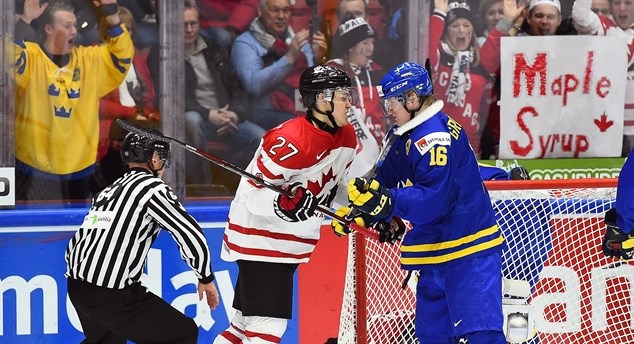
Here we meet again after a year: The 2017 Sweden-Canada semi-final will showcase the two highest-scoring World Junior teams. Pictured are Mitchell Stephens and Carl Grundstrom at the 2016 World Juniors. Photo: Matt Zambonin / HHOF-IIHF Images
Expect the unexpected in late semi-final
There’s zero room for complacency in the Sweden-Canada semi-final on Wednesday. It should be a fun game for the fans – perhaps less so for the coaches.
“Huge game,” said Sweden’s Rasmus Asplund, who had four assists in the 8-3 quarter-final romp over Slovakia. “I think it’s the test we want in this tournament for Team Sweden to face Canada in a semi-final at the Bell Centre. I think it’s the most fun game we’re going to play in our careers so far.”
So what exactly will ratchet up the tension to new heights between the IIHF World Junior Championship’s two highest-scoring teams (26 goals apiece)?
For Canada, it’s not only about being the host team in the world’s most hockey-crazed country. The Canadians have also won just one gold medal at the last seven World Juniors, well behind expectations. They’re trying to purge memories of going home empty-handed last year after being eliminated by eventual champion Finland. And defeating the Czechs 5-3 in the quarter-final is no guarantee of claiming some hardware.
Meanwhile, Sweden’s last gold medal came five years ago in Calgary. The only previous one was on January 2, 1981 in West Germany – 10 days before famous Swedish defenceman Niklas Kronwall was born, to put it in perspective. That’s a ridiculously sparse haul, given Sweden’s abundant hockey talent. Here in Montreal, the Juniorkronorna are the only unbeaten team, but they’ve also faced less stiff opposition in Group A. The two other semi-finalists, the U.S. and Russia, both came from Canada’s Group B in Toronto.
Canadian coaches are usually circumspect in their assessment of opponents, but when speaking to reporters on Tuesday, Dominique Ducharme openly questioned whether the Swedes are vulnerable: “They showed in the last 10 years that they’re really good in the first round, but they have ways to lose when things get tougher, and we want to make it tough on them. We’ll see how they react to pressure.”
However, Swedish coach Tomas Monten said: “It’s going to be a different style of game for sure if you play a North American team on North American ice, but we saved some juice for later.”
Frankly, neither side looks like an invincible juggernaut. Led by captain Dylan Strome and top D-man Thomas Chabot, Canada has the tournament’s best power play (39.13 percent). But the Swedes are right behind them (38.4 percent), and Canada’s PP came up empty in the quarter-final, whereas Sweden clicked three times, with captain Joel Eriksson Ek scoring twice.
Between the pipes, neither Canadian goalie has been entirely convincing, but Connor Ingram will start against Sweden. Carter Hart was supposed to carry the load at this tournament, but didn’t get the call against the Americans on New Year's Eve (a 3-1 loss), and hasn't played since. Ingram's save percentage (86.6) is lower than Hart's (88.10). As the Canadians try to exorcise their recent World Junior goaltending demons, be prepared for the possibility that we’ll see both goalies in the semi-final.
That’s also not out of the question for the Swedes. Felix Sandstrom’s 1.75 GAA and 91.6 save percentage look more impressive, but he faltered in the quarter-final when the Slovaks stormed back to make it 5-3 at the end of the second period and the start of the third. Back-up Filip Gustavsson had a solid World Junior debut, a 5-2 win over the Czechs, although he did allow two late ones. If Canada gets many power play chances, a barrage of shots may ensue: Sweden’s penalty kill is the tournament’s fourth-worst (72.2 percent).
“I’m not afraid of that,” said Sandstrom. “I think it’ll be great to play one of those games, where you have to really be great for your team, to be working really hard.”
The Canadians will key on silky, cerebral Alexander Nylander, who currently leads the tournament in scoring with 11 points. “He’s obviously a really good player,” said Strome. “He has a really good shot. He can skate and he’s got very good hands. We’ve got to be aware of him. He’s obviously putting up some good numbers in this tournament.”
But new heroes are emerging for the host team too, including forward Mitchell Stephens, who stepped up with a goal and two assists versus the Czech Republic.
“He’s an energy guy,” said Ingram. “I think he can play in every role. You can put him on the fourth line and let him shut down, or you can put him on the first line and let him score goals.”
Of facing Sweden, Stephens said: “They’re a great team and we’re a great team also. I think it’s going to take a 60-minute game by our effort, all 22 guys going at full pace.”
The early going may tell the story. If Canada is able to dictate a smart physical game and keep the Swedes hemmed in their own end, the hosts have the advantage. However, if the Swedes get room to move the puck and test the Canadian netminding, that could end Canada’s golden hopes.
“I think we’re a smart group,” said Swedish defenceman Oliver Kylington, logging a team-high 19:49 in average ice time. “We know what we want. We know what’s ahead of us. I think we need to play with our heads and stay calm and play our game. We don’t need to change anything.”
The only thing Sweden does need to change is its streak of semi-final losses (two straight years). The Canadians need to prove they can step up under pressure against arguably the most complete team they’ve faced yet. This could be a tight showdown, or it could be a laugher. And neither team can take anything for granted on Wednesday night.






